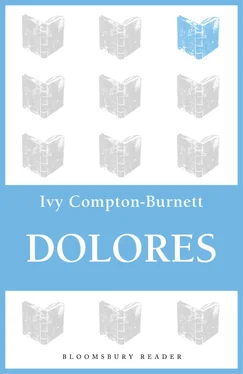Ivy Compton-Burnett - Dolores
Здесь есть возможность читать онлайн «Ivy Compton-Burnett - Dolores» весь текст электронной книги совершенно бесплатно (целиком полную версию без сокращений). В некоторых случаях можно слушать аудио, скачать через торрент в формате fb2 и присутствует краткое содержание. Год выпуска: 2013, Издательство: Bloomsbury Publishing, Жанр: Классическая проза, на английском языке. Описание произведения, (предисловие) а так же отзывы посетителей доступны на портале библиотеки ЛибКат.
- Название:Dolores
- Автор:
- Издательство:Bloomsbury Publishing
- Жанр:
- Год:2013
- ISBN:нет данных
- Рейтинг книги:3 / 5. Голосов: 1
-
Избранное:Добавить в избранное
- Отзывы:
-
Ваша оценка:
- 60
- 1
- 2
- 3
- 4
- 5
Dolores: краткое содержание, описание и аннотация
Предлагаем к чтению аннотацию, описание, краткое содержание или предисловие (зависит от того, что написал сам автор книги «Dolores»). Если вы не нашли необходимую информацию о книге — напишите в комментариях, мы постараемся отыскать её.
was published in 1911. It sold well, and was promptly forgotten. Now that her career of sixty years is ended, and her long achievement more and more acclaimed,
, standing at that remote beginning, is curiously reborn.
Dolores — читать онлайн бесплатно полную книгу (весь текст) целиком
Ниже представлен текст книги, разбитый по страницам. Система сохранения места последней прочитанной страницы, позволяет с удобством читать онлайн бесплатно книгу «Dolores», без необходимости каждый раз заново искать на чём Вы остановились. Поставьте закладку, и сможете в любой момент перейти на страницу, на которой закончили чтение.
Интервал:
Закладка:
A figure is walking through the churchyard towards the parsonage. A glance is knowledge. It is the figure of the Reverend Cleveland Hutton.
Perhaps it causes surprise that he should still be expending on the village of Millfield his ecclesiastical qualities, when it is remembered that he held the steps to preferment in his hands, in his literary and dedicatory powers. It certainly caused himself surprise; not to speak of bitterness of spirit, and a tendency towards the heretical opinion — more worthy, as it is very justly observed, of a Dissenter — that the Establishment was no better than ordinary, unestablished institutions, in its blundering location of its dignities. And from certain points of view it can hardly seem judicious in Providence, and that foremost of her handmaids, the Establishment, to neglect the advance of a reverend gentleman who has written three pamphlets and dedicated two to his bishop, and not failed to write to the latter on each of the last occasions to request his permission to evince his regard in this manner. It seems so less, when she elevates to a deanery his brother, who has merely printed a booklet entitled “Some Simple Sermons on Great Subjects”—of which attributes, only the former, as the Reverend Cleveland had observed, was to be referred to himself in his creative rather than selective aspect, that is, the aspect in which he was rightly assumed to consider himself revealed — without dedicating it to any one. The folly is clearer, when the former brother has five children and the latter none; though it should perhaps be said in justice to Providence, that study of her dealings suggests, that possession of children appears to her compensation for lack of possession in other respects.
The Reverend Cleveland’s somewhat morose and heavy countenance was more morose than usual, as he wended his way up the sloping path through the churchyard to the parsonage. He was returning from seeing off at the station his brother, the Very Reverend James — a courtesy rendered compulsory by the rarity of meeting resulting from the removal to the deanery. He was also suffering the emotions following the fraternal office of intimating to the latter, that he was aware of the source of the chief ideas in his booklet — some volumes which had been at their joint disposal in boyhood — without reward in signs of incision in the armour of gracious complacence, protecting a very reverend gentleman, taking leave of his barely reverend brother.
But there creeps a change to his face, as he passes to the side of the churchyard which skirts the parsonage garden, and creeps at a moment when change is meet. Yes; it lies in his sight — the tombstone whose writing opens memory’s floodgates—“In remembrance of Dolores, beloved wife of Cleveland Hutton, Vicar of this Parish, who died in the thirty-sixth year of her age.”
But do we forget what was said of the Reverend Cleveland Hutton? He is not a man apart. Do we pity a sorrow hard in time-begotten silence? Let us mark his eyes — the eyes of one fearful of breaking memory’s sleep. Some random words recur; and your thought is a thought you will not voice. But it is a thought which carries truth. There is another mistress at the parsonage.
No; let us check the words which tremble on our lips. Let us not say them. Let us not say, “Poor human love, that it can lightly bury its dead!” Let us hold our peace, and pass on.
Mr Hutton unlatched the gate which led to his garden from the churchyard, and walked up the gravel path to the parsonage. The voice of Mrs Hutton, who stood on the steps awaiting him — a mellowed, mature voice; for the Reverend Cleveland was not a man to succumb with improvidence to earlier maidenhood — greeted him as he came within hearing.
“Well, dear, so you have parted from the Dean? How do you support the thought of six months in the darkness of his absence? You seem to be bearing up fairly well. Did you ever see such popish pomposity? I wonder what would be the result if they made him a bishop?”
The Reverend Cleveland made no reply for a moment. He was not averse to laughing at his very reverend brother; but contingencies are sometimes broached, which hardly call for sanction even in jest.
“I cannot see — from what 1 can gather from James — that a dean’s life is any more arduous or responsible than an ordinary vicar’s,” he observed, with an accent of bitterness, as he walked into his study.
“Well, I certainly never saw James looking in better condition,” said Mrs Hutton; “not that his appearance has ever suggested his wearing himself out with toil.” The Reverend Cleveland readily saw his brother’s ampleness of frame a ground for smiling. “I wonder if he will use his leisure to write another booklet. Perhaps this time it will be ‘Great Sermons on Simple Subjects.’” The Very Reverend James’s isolated literary effort was a recognised subject in Mill-field Parsonage for spare ironic talent.
“I can hardly imagine James writing anything great,” said Mr Hutton, yielding to some crudeness in fraternal comment.
“Ah, my dear, you never imagined him a dean until you saw him one,” said Mrs Hutton.
“He did not make himself a dean,” said Mr Hutton, deprecating the judgment of the actual agents implied.
“Well — peace be to him — and to ourselves, for the time,” said Mrs Hutton. “I have had enough of him for one day. I wonder what he would feel if he could hear us. I should think his left ear must be burning.”
“Oh, I have never known James anything but sublimely complacent,” said Mr Hutton, indicating the unlikelihood of his brother’s suffering this discomfort; and speaking as though he considered a tendency to discontent some moral tribute — a view which would have added to his own self-regard.
Mrs Hutton laughed; and walking to the window, began to watch her children in the garden — two little daughters at play under the eye of a nurse, and a baby boy, to whose mind there seemed nothing wanting in the exercise of staggering as a source of indefinite amusement; from time to time bestowing some advice, voiced with rather unnecessary sharpness, upon the nurse’s handling of her charge. The Reverend Cleveland took up his pen, and drew some sermon paper towards him with some austerity of mien.
Sophia Hutton was a woman of five- or six-and-forty, with the manner of carrying years which shows maturity a seemlier thing than youth. When there was added to this gift a generous dower of brunette comeliness and a gentle dignity of bearing, she appeared to the Reverend Cleveland — in the fuller bloom of ten years earlier — a fitting mistress for the stately home which preferment was to bring. For this she seemed to herself no less a fitting mistress; but confinement to a home for which she was less adapted had cost her feelings milder conflict. There was a certain discernment in her survey of things, which saved her a too disturbing perplexity on the Bishop’s philosophy in viewing the Reverend Cleveland in a merely beneficed condition. Moreover, the maidenhood attending an imperious youth having outlasted the youth, she did not compare the lot of mistress of a sufficient household only with that of the mistress of a stately one, but also with a lot where mistresship played no part. The attractions of linking her portion with the Reverend Cleveland’s had not been enhanced in her eyes by the son and daughter by an earlier marriage. The father, whose home she ordered, had himself taken a second wife; and though her late esteem of stepmothers had not been flattering to the class, she found that their sway appeared less repellent regarded as wielded than obeyed.
As you watch her, do you mark the something of tone and gesture which touches some familiar chord — such a chord as is touched when, after the remembrance of your friend is dim, you come upon his son grown to a similar manhood? Listen to her tones, as she leans from the window with some words to her children on her lips — to that note which holds a latent peevishness as though in wait for a purpose. Yes, it is Mrs Blackwood to whom she is bound by the bond of kin. Ten years earlier, in the days ensuing on bereavement, when the heart is grateful for pitiful human fellowship, and human fellowship is kind, the Reverend Cleveland had passed some time with his good-hearted and genial, if dissenting and emphatic, neighbour. He had met Sophia, the elder sister of his wife, and had induced her to assume the lost relation to himself. In this step she was influenced partly by reasons given, and partly by a genuine, if not a fervid, affection and esteem for the Reverend Cleveland Hutton.
Читать дальшеИнтервал:
Закладка:
Похожие книги на «Dolores»
Представляем Вашему вниманию похожие книги на «Dolores» списком для выбора. Мы отобрали схожую по названию и смыслу литературу в надежде предоставить читателям больше вариантов отыскать новые, интересные, ещё непрочитанные произведения.
Обсуждение, отзывы о книге «Dolores» и просто собственные мнения читателей. Оставьте ваши комментарии, напишите, что Вы думаете о произведении, его смысле или главных героях. Укажите что конкретно понравилось, а что нет, и почему Вы так считаете.












